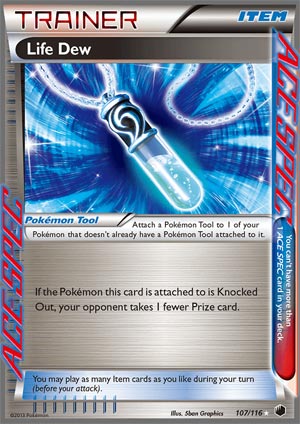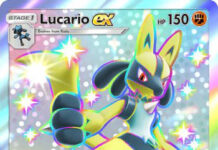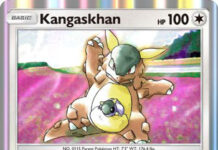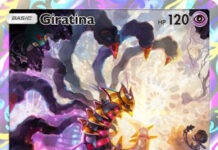 Life Dew
Life Dew
– #PLF-107
Date Reviewed:
October 3, 2017
Ratings & Reviews Summary
Standard: N/A
Expanded: 3.18
Limited: 4.67
Ratings are based on a 1 to 5 scale. 1 is horrible. 3 is average. 5 is great.
Reviews:
 aroramage |
…Life Dew, that is. Get it? Cause song lyrics and card names and-okay. Life Dew is another of those old-fashioned ACE SPEC cards, and this one is one of the Tools. Unlike the more specific ones like Crystal Edge, Crystal Wall, or Victory Piece, Life Dew is more of a generic ACE SPEC Tool, and its usage is…well, decent. If the Pokemon that Life Dew is attached to ends up getting KO’d, they get to take 1 less Prize. Prize denial isn’t one of the most powerful things out there, but it’s very important – keeping your opponent from winning the game can give you the time you need to win the game yourself! That said, you’d also probably aim more to use Tools that win you the game faster rather than stall the game out for your opponent. This is one of the reasons it’s more of a “middle of the road” route – you end up keeping your opponent from winning, but you’re not pushing for the win either. If anything, you may even have lost a big part of your strategy, and Life Dew isn’t exactly something that can come back. …well, okay, that’s not true, it can be reused. You just gotta use resources to constantly recycle it and be using it a lot. And frankly, that just means there’s a better Tool for you. No, Crystal Wall is not that Tool. Rating Standard: N/A (Life Dew can work in some decks, like Gold Potion) Expanded: 2.5/5 (but it’s not the end-all be-all for ACE SPECs) Limited: 5/5 (though in a smaller environment with a smaller pool of cards and a smaller Prize selection? Oh sure, run it) Arora Notealus: Life Dew’s applications are limited, but its effect is no less powerful. It’s just a matter of taste though – I’d imagine having another Muscle Band or Choice Band would be more useful than just running one of this and expecting to have the recycling capacity to deny your opponent ALLLLLLLLLL the KOs. Next Time: An elixir might not do, but a mighty shield… |
 21times |
Life Dew (Plasma Freeze, 107/116) begins our Ace Spec reviews for this second (and final) Inverse Week. This Tool card reduces the number of prize cards your opponent takes by one card. For example, if this card is attached to a single prize Pokemon that is KO’d by your opponent, your opponent does not get to take a prize card. If this card is attached to a two prize Pokemon that is KO’d by your opponent, he or she only takes one instead of two prize cards. I don’t think this card needs any explanation as to how good it could potentially be. The problem is that tool removal was probably more common a year and a half ago than today. I’ve written about this before, but I think there are a number of players who are still collectively in denial about tool removal. I think that stretch of eight months between September 2016 and April 2017 where there was virtually no tool removal really ingrained itself in a lot of people. I think people are still not playing enough Field Blowers (Guardians Rising, 125/145). I’ve played some Garbotoxin Garbodor (Breakpoint, 57/122) recently, and most of the time people can’t get their Field Blowers quickly or frequently enough to shut down Garbotoxin. Similarly with Wishful Baton (Burning Shadows, 128/147): I’ve found that it sticks a lot. Not every time, but definitely more than half of the time. If you are running an ability dependent deck, I strongly advise you to run four Field Blower. There are so many Tools out there that you won’t regret playing the extra two copies. You don’t have to worry about playing a Field Blower early on because you know you still have three left. I’ve also seen it happen a number of times that I put a single Tool or Stadium out on an early turn, and my opponent frequently uses Field Blower on that single Tool or Stadium card. I know I’m not the only one who has picked up on this tactic – I heard a Youtuber mention and use that same baiting trick in a video just the other day. Granted, if you have both Field Blower and Professor Sycamore (Steam Siege, 114/114) in your hand, you don’t have any choice but to use the Field Blower. With the prevalence of N, however, you might just as often have the option of not playing a card simply because its border is glowing. Rating Standard: N/A Conclusion I remember latching on to Life Dew early on and was very disappointed with the frequency of which it was discarded without being able to be used, so I decided to move away from the Tool Ace Spec cards. I don’t think there’s a Pokemon out there in the Expanded universe with an ability that prevents Tool removal – if there is, then I would definitely recommend trying Life Dew in tandem with that Pokemon. However, I still think that either Computer Search (Boundaries Crossed, 137/149), Dowsing Machine (Plasma Storm, 128/135), or Scramble Switch (Plasma Storm, 129/135) might serve you better than Life Dew though. |
 Otaku |
We return to our coverage of Ace Spec cards with Life Dew (BW: Plasma Freeze 107/116): a Trainer-Item and Pokémon Tool, that reduces the amount of Prizes your opponent takes when the equipped Pokémon is KO’d by one. Players are only allowed to have a single Ace Spec card in a deck. This is a limit not just on how many different Ace Spec cards you may run nor on how many of an Ace Spec you may run, but both. It isn’t as restrictive as the GX-attack mechanic, as you are able to play your Ace Spec more than once, should you have the means of recycling it. So every Ace Spec is in direct competition with the others! This mechanic was introduced in the BW-era, and hasn’t been reused since; you won’t find Ace Spec cards in Standard. You will, however, see them feature prominently in most competitive Expanded and Legacy Format decks. Besides my fondness for the Legacy Format, the Expanded Format is being used for multiple Regional Championships this year, so revisiting these cards seemed so pressing, we scheduled a special, inverted two weeks where we look at only one new card each week while the other four days are all “Throwbacks”. Being a Trainer is mostly important to an Ace Spec because it might be snagged via Skyla or Trainers’ Mail; other Trainer support hasn’t proven competitive and tends to be very deck specific. The good news for us as a whole is that all Trainer counters in these formats are also very deck specific and haven’t proven competitive. Being an Item doesn’t add any new general support in Expanded, but allows Ace Specs to be recycled via Junk Arm in the Legacy Format. That is up to four additional uses! Some decks will have more specific combos as well, like Korrina for Fighting-Type decks. We’ve got Item counters like Ghetsis that can fit into just about any deck, Seismitoad-EX that can fit into most decks, and multiple Pokémon-based deck-specific options, more so in Expanded than in the Legacy Format. If Item cards weren’t such a good deal, the number of counters would probably have us avoiding them entirely. Life Dew is also a Pokémon Tool; that means a few extra bits of support like Eco Arm but a lot of counters, including but not limited to nasties like Field Blower or Startling Megaphone. There is even one card that is specifically anti-Ace Spec, Spiritomb (BW: Legendary Treasures 87/113); even though that is a very specialized job, it has proven useful at times. There are no cards that help Ace Specs, at least as their intended focus, but anything that can recycle something effectively from the discard pile can fake it. Best example right now is Puzzle of Time or the already-mentioned Junk Arm. So with all of that finally said, what about the actual effect of reducing the Prizes your opponent takes? It won’t win you the game directly, but you can’t win if you’ve already lost. Putting this effect into perspective, think of how devastating it would be if you just could not take any Prizes against an opponent? You’d have to win by Bench Out, Deck Out, or Lost World (the latter only an option in the Legacy Format)! Life Dew isn’t that potent, but any deck can use it to try and deny your opponent a Prize they would have otherwise earned. Normally you’ve got to mix single Prize Pokémon in with double Prize Pokémon to force your opponent to an extra Prize for the win; Life Dew allows it without mixing. It can take the sting out of Pokémon that KO themselves, whether due to your own strategy or your opponent’s. It can also frustrate those few decks capable of taking extra Prizes for their KO’s. Decks that can spam Life Dew can effectively wall an opponent; technically, your opponent is still scoring KO’s and you’re still losing resources due to your Pokémon being KO’d but it gives you time for other strategies to work. Sableye (BW: Dark Explorers 62/108) and its Item-recycling “Junk Hunt” attack have a deck built around this, but I do not know if it still works. So when is Life Dew not useful? Some decks have done well without an Ace Spec; I don’t know if it was by necessity or design. Some decks win without taking any Prizes whatsoever; they don’t care about Life Dew unless its mere presence feeds another effect. The big two issues are when a deck needs another Ace Spec more and/or easy counters. Another Ace Spec being better – or essential – to a deck is what it is, but there are a lot of ways your opponent can deal with Life Dew. Besides what has already been mentioned – Spiritomb, Item counters, and Tool counters – your opponent may also be able to play around it by KOing whatever Pokémon you have in play that don’t have Life Dew attacked. This is actually pretty easy in the Expanded Format, thanks to cards like Guzma. Even with all the drawbacks, Life Dew is a very good Ace Spec. Decks capable of protecting it, spamming it, or somehow comboing with it should really give it a look in the Expanded and Legacy Formats. A few more I haven’t mentioned are Tool Drop decks built around Trubbish (BW: Plasma Storm 65/135) and its attack of the same name, those with one-sided Item-lock (most Tool counters are also Item cards), and those with effects that specifically protect Tools or attached cards for your Pokémon. I cannot give proper examples for those last two because Pokémon like Seismitoad-EX or Primal Groudon-EX (XY: Primal Clash 86/160, 151/160) are better paired with other Tools, other Ace Spec cards, or both. It has its place in both the Expanded and Legacy Formats, would have one if it were reprinted for Standard usage, and the only reason you might not run it in Limited is if you also pull Rock Guard. Ratings Standard: N/A Expanded: 3.5/5 Limited: 4/5 Legacy: 3.75/5 Conclusion Life Dew is not one of the top tier Ace Spec cards, but it is by no means a bad card. Most games are won through Prizes, denying an opponent a Prize gives you more time to win and denies them access to what could be an important resource to which they lack access. Life Dew doesn’t have the general usage potency of Computer Search or Dowsing Machine. Unfortunately for it, even Rock Guard, Scramble Switch, Scoop Up Cyclone work well in some of the situations that favor Life Dew. The silver lining is that this means Life Dew tends to be a solid budget option, be it the physical card or its PTCGO counterpart. |
 Vince |
Over the course of last week’s and this week’s COTD, we will be reviewing two cards from the Burning Shadows expansion on Mondays and eight Ace Spec cards on the rest of the weekdays. If you don’t know what an Ace Spec card is, it is a mechanic that existed between BW Boundaries Crossed until BW Plasma Blast. Based on 13 cards, they’re all trainer-item cards. These are item cards that are said to be very powerful that only one Ace Spec card is allowed per deck. This means as soon as you designate your Ace Spec card of choice, you are barricaded from using 12 other Ace Spec cards, so choose wisely. This mechanic can also affect card legality from much older cards such as Computer Search and Master Ball, but more on that later. We decided to leave out Pokemon specific Ace Spec cards (there are five of them, two for Kyurem, one for Victini, and two for Genesect) and review only eight Ace Spec cards that doesn’t care about what deck you’re playing. All Ace Spec cards are Expanded and Legacy legal, and I may put Unlimited scores for Computer Search and Master Ball as well. I may also score Standard even though it’s no longer legal, kind of a hypothetical score. Today’s Ace Spec card is Life Dew from BW Plasma Freeze. This card hasn’t been reviewed by the crew. It’s a passive Pokemon Tool which the holder is worth one less prize cards. This could make opponent’s take a 7th prize card; Single prize attackers will be worth no prize while EX and GX Pokemon will be worth one prize. Lately, I’ve seen cards that interact with Prize cards such as Umbreon EX’s Endgame attack and GX versions of Ultra Beasts from the SM Crimson Invasion set. Guzzlord’s Glutton GX is Umbreon EX’s Endgame on steroids! It may cost DDDDD for 100 damage, but if you manage to knock out a Pokemon with this attack, you get to take two more prize cards! Regular Pokémon would be 3 prizes while EX/GX Pokemon is worth 4 prizes! Life Dew may be important in toning down multiple prize takes. At least that makes opponents think critically whether or not they will play their Field Blowers to get rid of this tool. In limited, you’ll run this if you pulled one, it’ll make the game last longer and the opponent makes no progress even though they knocked out one of your Pokémon. Ratings: Standard: 3/5 (Kinda wished I still have this card) Expanded: 3/5 (I gave it to a friend who is making a Sableye deck with Junk Hunt!) Limited: 5/5 (If you pulled one, why not?) Legacy: 3/5 (EX Pokémon and Pokémon Legend would be less of a liability). Sylveon’s Notes: Aww, this is so beautiful, can I wear it? Coming Up: That helmet is pretty dangerous! |
 Retro |
Today we’ll be looking at a very unique card that surprisingly is a very adaptable and powerful in every deck that it can ever be in. And its Life Dew (BW Plasma Freeze), a near staple in stall decks and a very powerful inclusion in even just your everyday deck. So adaptive and powerful in fact, that it becomes an Ace Spec card, so you can only use one in a deck. What makes this piece of potion so powerful is the fact that it’s effect is perfectly capable of swinging game momentum just when its presence lets itself known. Life Dew is a Pokemon Tool card, that when attached, gives a -1 prize to the Pokemon that the Life Dew is attached to. For example, the deck that regularly uses Life Dew, such as Sableye (BW Dark Explorers)/Garbodor (BW Dragons Exalted/XY BREAKpoint) or some variants of Night March (XY Phantom Forces) used it to deny prizes when their Sableye or Joltik/Pumpkaboo is knocked out by any means. And, despite the ruling of Life Dew saying that only one copy can be used in a deck, these decks used various methods to retrieve the Life Dew back to play, such as using two Puzzle of Time (XY BREAKpoint) or the aforementioned Sableye’s Junk Hunt to put 2 Item cards from your discard pile back to your hand. The idea of using Life Dew is simple; you can keep continuing your game plan, either by stalling or by dealing massive damage, and still have the game momentum upon you because you know, if your opponent cannot react to the Life Dew you just played to your Pokemon, they cannot take a prize and you are still ahead on the prize race. However, despite Life Dew being one of those Tools that doesn’t really care too much about that thing called “power creep”, as it has a fixed effect that is appreciated in any format, it still has to face a very big weakness, but thankfully its a weakness that not only it faces; its a passive Tool card. Unless the dew is attached to a Pokemon called Trevenant (XY Base Set), Noivern-GX (SM Burning Shadows), Seismitoad-EX (XY Furious Fists) or Vileplume (XY Ancient Origins), it is rather hard to keep Life Dew in play for a long time. On average, it’ll be just 2 turns before your opponent finds a Field Blower (SM Guardians Rising), Startling Megaphone (XY Flashfire), or even worse, Xerosic (XY Phantom Forces) and get rid of the Life Dew before taking a knock out of said Pokemon. Fortunately, that is the only weakness that Life Dew has; and so it remains a powerful, yet affordable Ace Spec card that can be used in nearly every deck, as long as you can manage using and getting it back over and over again. Rating: Expanded: 3.7/5 (Its a really good card for its own sake, and it has great value for money. A great starting Ace Spec for those who can’t afford getting a Computer Search or Dowsing Machines.) Next in Inverse Week: |



